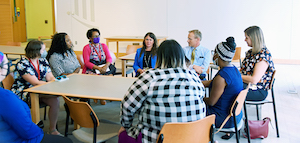Future of Work Task Force Gets Down to Work
September 21, 2022 Mary Therese Phelan
At a kickoff meeting, task force members met one another in person for the first time and discussed the many ways in which the workplace landscape has changed since the spring of 2020.
In a letter to the University of Maryland, Baltimore (UMB) community in April, President Bruce E. Jarrell, MD, FACS, announced plans to create the Future of Work Task Force, which “will help us think through the changing needs of this institution, support our existing workforce, and plan for the future.”
At a kickoff meeting in August, task force members met one another in person for the first time and discussed the many ways in which the workplace landscape has changed since the spring of 2020, when the COVID-19 pandemic began wreaking havoc on what people everywhere once considered “normal” life. The event also marked the launch of the Future of Work Task Force website as well.
“I can’t take the smile off my face because I’m just so excited about this work,” Malika S. Monger, MPA, PHR, associate vice president and chief human resources officer of UMB’s Human Resource Services, said as she welcomed task force members.
“I feel like this is a pivotal moment for our UMB community. And what we’re trying to do in this work is hugely important,” said Monger, who is a task force co-chair along with Flavius R.W. Lilly, PhD, MA, MPH, vice provost of academic and student affairs and vice dean of the Graduate School, and Diane Forbes Berthoud, PhD, MA, chief equity, diversity, and inclusion officer and vice president. “We definitely have our work cut out for us.”
The task force is composed of three committees: Work Flexibility, Employee Value Proposition, and Employee Well-Being. The committees, which reflect Universitywide representation, are charged with developing short- and long-term recommendations to leadership related to work flexibility, employee value proposition (why people want to work at, and remain, at UMB), and employee well-being. The committees also will address other needed resources, including technology, training and development needs, and any other identified resources required to ensure UMB continues to be an employer of choice now and in the future.
In addition, a human resources work group will be charged with creating a job needs assessment tool, ensuring policies and practices reflect the recommendations of the task force and identifying the strategic workforce planning needs of UMB.